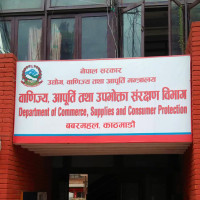- Thursday, 5 February 2026
Food crisis continues despite huge budget in agriculture
By Our Correspondent,Baitadi, Dec.6: The provincial and local governments have been spending more than Rs. 230 million annually in Baitadi alone to increase agricultural production. As production does not increase according to investment, there is still a compulsion to bring consumer goods ranging from rice, potatoes and eggs from outside to meet the local demand.
While Baitadi residents require 48,000 tonnes of food grains annually, only 29,000 tonnes of food grains, including 13,000 tonnes of maize, 10,000 tonnes of wheat and 6,000 tonnes of paddy are produced in the district.
According to the Agricultural Knowledge Centre, Baitadi, around 18,000 tonnes of food grains are brought from outside annually to meet the annual requirement. Like in the previous years, in the fiscal year 2024/25, around Rs. 230 million is going to be spent through the government bodies in the agriculture sector in the district.
Of them, the Agricultural Knowledge Centre, Baitadi is going to spend about Rs. 100 million, the Animal Service Expert Centre Rs. 80 million, and the rural municipalities and municipalities Rs. 50 million.
No matter how much budget the government spends on the agriculture sector, Baitadi and other hilly districts still bring rice and wheat from the Tarai and eggs from Chitwan, said Sher Singh Bhandari, treasurer of the Baitadi Chamber of Commerce and Industry.
Similarly, to alleviate the food crisis, the Food Management and Trading Company Limited has opened depots in four places in Baitadi and is supplying around 4,000 to 7,000 quintals of rice annually.
Anjila Basnet, chief of the Food Management and Trading Company Limited, Dhangadhi office, said that around 400-7000 quintals of rice are supplied annually to the Gothalapani, Melauli, Kulau and Purchaudi depots in Baitadi under the food transportation subsidy of the government.
The company has been supplying rice under the transportation subsidy to Baitadi, Darchula, Bajhang, Bajura and Achham districts.
Basnet said that the price of coarse rice has been fixed at Rs. 64 per kg this year.
Poor production Officials working in the agriculture and livestock sector have admitted that despite the government's investment of millions of rupees in the agriculture and livestock sector, production has not increased as per the expectation.
Mahesh Pandey, Information Officer of the Agricultural Knowledge Centre, Baitadi, said that the provincial government often comes up with distribution-oriented plans specifying particular villages.
He said that such plans are more focused on training, and structure construction, instead of production, so a large amount of money is spent on them.
He said, “In the current fiscal year, 62 plans of the provincial government were allotted to specific villages, so we are monitoring whether there are real farmers or not. Plans that have been given a specific location in the budget cannot be changed. Even if the budget is frozen, it will be difficult for employees like us.”
Gorakh Bahadur Chand, Chairman of Pancheshwor Rural Municipality, said that the local government did not receive information about the agricultural and livestock programmes run by the provincial government that were given to particular villages and wards.
He blamed that agricultural and livestock plans were being distributed to non-farmers based on power and access.
Chairman Chand said, “Until all three levels of government do not classify farmers and distribute identity cards, the misuse of the budget by non-farmers in the name of farmers will continue. Until a strong policy is formulated, non-farmers will continue to misuse state resources in the name of genuine farmers.”
Bimala Wad, a leading farmer of Dasharathchand Municipality-4, complained that the genuine farmers were not taking any advantage of the agriculture plans after the Ministry of Land, Management, Agriculture and Cooperatives of Provincial government allocated schemes by specifying the names of villages and localities.
She said, “Although 15 farmers of Babet village have been cultivating organic vegetables for the past four years, no programme has been implemented in the village so far.”
Dr. Bishal Pathak of the Veterinary Hospital and Animal Service Expert Centre, Patan of Baitadi, said that like the Agricultural Knowledge Centre, the budget for livestock programmes is also allocated by mentioning the names of certain villages and localities.
He said that in the current fiscal year, the provincial government has allocated 34 schemes by specifying the wards of various municipalities.
The Veterinary Hospital and Animal Service Expert Centre is spending a budget of Rs. 80 million this year.

















